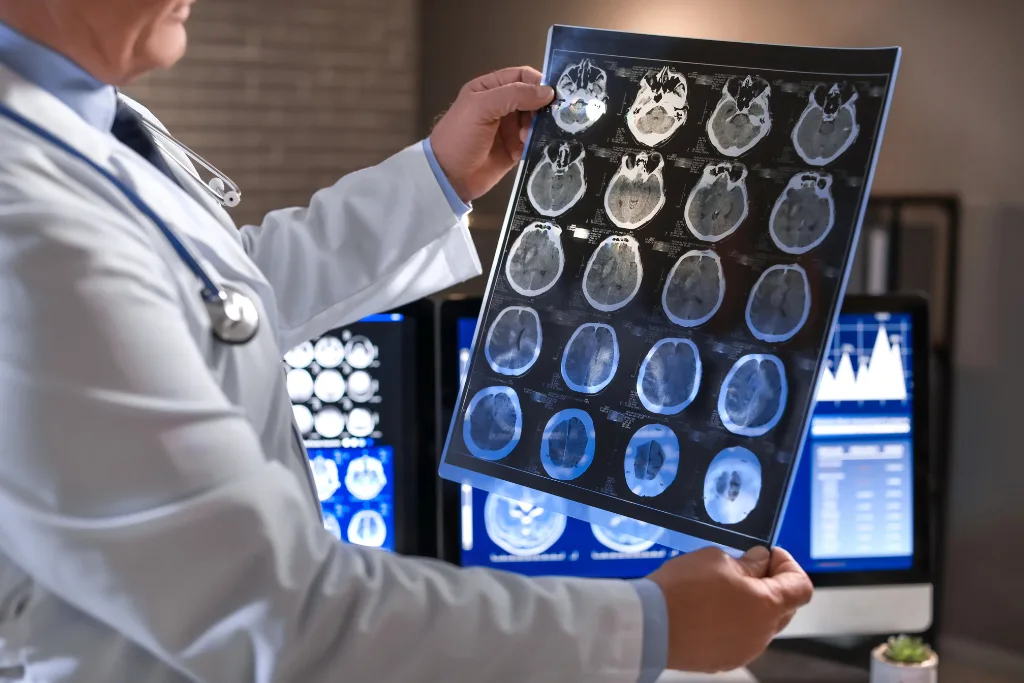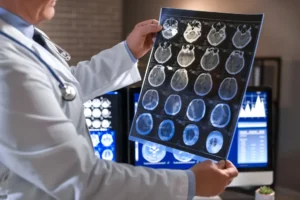
How Online Neurologists Provide Legal Reports for Injury Claims
Neurologists are important in injury cases involving the brain or nervous system. These medical experts don’t merely treat patients; they also deliver potent, court-admissible opinions that can affect the outcome of lawsuits and compensation claims. Today, online neurologists can accomplish this on the telemedicine platform without ever darkening a courtroom or a clinic.
This article will cover the details of how online neurologists submit their expert legal reports, their involvement in negligence claims, and why you should look to neurologists for their opinions in difficult injury cases.
What Does a Neurologist Do in Legal Injury Claims?
Neurologists are specialists who treat disorders of the nervous system (brain and spine). Their opinions are especially important in personal injury cases, malpractice, and medical negligence that involve neurological conditions.
Common Neurological Conditions in Legal Cases:
- Traumatic Brain Injuries (TBIs)
- Stroke and acute ischemic events
- Seizure disorders (e.g., epilepsy)
- Nerve compression and spinal cord injuries
- Chronic headaches or migraines
- Neuropathy or autonomic disorders
Neurologists are charged with giving a neutral expert opinion in a legal setting regarding the degree of injury, causation, and difficulty achieving long-term recovery. Their reports are often used in both civil and criminal cases, particularly where negligence is claimed.
Why Legal Reports from Neurologists Matter
When you’re dealing with a lawsuit, especially involving medical malpractice or personal injury, having a clear and credible neurological report can make or break the case.
What Neurologists Contribute to Legal Cases:
- Medical expertise in complex neurological injuries.
- Diagnosis and explanation of symptoms.
- Prognosis and long-term implications of the condition.
- Assessment of standard of care in negligence or malpractice claims.
- Expert witness testimony during litigation.
These reports play a key role in establishing how severe the injury was and if it resulted from negligence, bad decision-making, or events outside of the medical professional’s control. Essentially, a neurologist bridges clinical knowledge with legal accountability.
How Online Neurologists Provide Medico-Legal Reports Remotely
The digital era has brought a revolution in healthcare delivery. Today, online neurologists can deliver medico-legal reports through secure telemedicine platforms, maintaining the same professional standards as in-person services.
The Step-by-Step Process:
- Telehealth Consultation: Patient discusses history, symptoms, and injury details via secure video call.
- Review of Medical Records: The neurologist examines scans (MRI, CT), lab results, and previous diagnoses.
- Virtual Assessment Tools: Neurologists use validated online tools to test cognitive, motor, and sensory function.
- Report Drafting: A formal, well-structured medico-legal report is written.
- Court Submission: The report is submitted as evidence or used to support legal arguments.
Note: These virtual reports still adhere to legal standards of professional practice and can be admissible in court if they meet jurisdictional criteria. This aligns with American medical guidelines for remote neurology services.
Benefits of Online Services:
- Faster access to medical experts.
- Reduced costs for attorneys and clients.
- Nationwide availability of top-tier neurologists.
- Convenience without sacrificing report quality.
Online neurologists must adhere to the standards of practice laid out by regulatory bodies such as the American Board of Psychiatry and Neurology and the American Academy of Neurology.
The Qualifications of a Neurologist Expert Witness
Qualifications Checklist:
Requirement | Description |
Board Certification | Must be certified by recognized boards (e.g., ABPN) |
Years of Clinical Experience | Demonstrates knowledge and hands-on expertise |
Medico-Legal Training | Experience writing reports or testifying |
Ethical Standing | No disciplinary actions or history of medical errors |
Knowledge of Legal Standards | Familiarity with standards of care and courtroom procedures |
Neurologists and Medical Negligence Cases
Many medical negligence cases rest on whether a physician’s behavior was below the accepted standard of care. Neurologists are key in diagnosing:
- Failure to diagnose neurological conditions.
- Delayed treatment of emergencies like stroke.
- Mismanagement of post-injury care.
- Incorrect use of neurosurgery or medication.
- Clinical negligence leads to permanent neurological damage.
A neurologist can pinpoint if the injury was preventable and whether the negligence caused the neurological condition.
Traumatic Brain Injuries and Other Neurological Conditions
When dealing with head trauma, the mechanisms of injury can be subtle but life-changing. From concussions to diffuse axonal injuries, neurologists assess not just visible damage but also cognitive impairment, behavioral changes, and future risks.
Types of Injuries Commonly Seen:
- Mild TBIs with post-concussion syndrome
- Severe TBIs requiring long-term care
- Spinal cord trauma
- Autonomic nervous system dysfunction
- Neurological diseases triggered by physical trauma
Neurologists determine whether these outcomes are temporary or permanent, which is crucial for accurate compensation claims.
The Neurologist’s Role in Compensation and Disability Claims
Insurance companies and courts rely on neurological reports to establish:
- Extent of disability
- Need for rehabilitation
- Loss of earning capacity
- Care needs and projected costs
An expert neurologist report can support claims for:
- Workers’ compensation
- Auto accident settlements
- Medical malpractice damages
- Military or government disability pensions
Without these reports, victims may struggle to get the financial support they deserve.
How Neurologists Deliver Expert Testimony in Court
In many legal proceedings, written reports aren’t enough. Neurologists may be required to testify in court, especially when facing cross-examination.
What They Bring to the Courtroom:
- Clear explanations of complex neurological data.
- Support for or against the presence of negligence.
- Visual aids such as MRI images or nerve conduction studies.
- A calm, professional demeanor under questioning.
Today, much of this can even be done via remote video testimony, especially in jurisdictions embracing digital trials.
How to Hire an Online Neurologist for Legal Matters
If you’re a lawyer, insurer, or injured party looking to hire a neurologist, here’s what to consider:
Checklist:
- Check credentials and board certification.
- Ask for sample medico-legal reports.
- Ensure familiarity with legal proceedings.
- Confirm turnaround time and pricing.
- Evaluate communication clarity.
You can find qualified neurologists through:
- American Medical Association directories
- Legal-medical consulting firms
- Telehealth expert witness platforms
Challenges in Online Neurology Legal Reports
Despite the benefits, there are limitations.
Common Challenges:
- Physical exams are harder to conduct remotely.
- Image review must be handled securely.
- Opposing attorneys may challenge the validity of virtual assessments.
- Jurisdictional rules vary when accepting remote expert reports.
Still, with the right approach and detailed documentation, online neurologists can provide strong, reliable support in legal claims.
The Intersection of Neurology and American Medical Standards
Neurologists must base their opinions on peer-reviewed evidence, professional guidelines, and American medical standards. Their ability to provide detailed, unbiased reports is what separates credible experts from questionable ones.
Standards of Medical Testimony Include:
- Consistency with evidence-based medicine
- Reference to clinical neurology guidelines
- Clear explanation of how the injury caused neurological damage
- Transparent methodology and diagnostics
Final Thoughts: Neurologists Are Essential in Today’s Injury and Negligence Claims
Neurologists online have become invaluable friends of the court. Whether you are proving negligence, evaluating the impact of a brain injury, or advocating for maximum compensation, their medical expertise provides clarity when it is most needed.
By applying specialized knowledge, modern technology, and the standards of American medicine, these experts help to ensure that neurological issues are understood and that justice is done.
Frequently Asked Questions
Can an online neurologist testify in court?
Yes, many courts accept remote expert testimony via secure video.
Are these reports legally valid?
Yes, as long as they meet jurisdictional requirements.
How long does it take to get a report?
Usually between 7 and 7–21 days, depending on case complexity.
Is a physical exam mandatory?
Not always records and imaging often suffice for evaluation.
Are the reports confidential?
Absolutely. All medical information remains protected under HIPAA laws.
Stay informed with expert insights on neurology, treatments, and wellness. Browse our latest articles to discover valuable tips, research updates, and expert advice on neurological health.
What to Expect During a Virtual Neurology Consultation As the...
Read MoreHow Online Neurologists Provide Legal Reports for Injury Claims
How Online Neurologists Provide Legal Reports for Injury Claims Neurologists are...
Read MoreBenefits of Virtual Neurology Consultations for Injury Victims
Benefits of Virtual Neurology Consultations for Injury Victims When someone...
Read MoreSymptoms That Require a Neurology Consultation After an Auto Accident
Symptoms That Require a Neurology Consultation After an Auto Accident...
Read More


